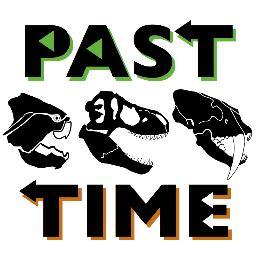Paleo Podcasts
When I work out, I sometimes listen to a mix of aggressive electronica and high-energy dance music to get me moving. But usually, I use my gym time to catch up on podcasts. My new year’s fitness resolutions mean I’ve been updating my mp3 player with new podcasts, including some paleontology-themed ones. The problem is, when you go to iTunes and search “paleontology”, “palaeontology”, or even “dinosaurs”, you don’t get much. Here are a few for the paleo-minded.
I’ll begin with a plug for my peeps: Past Time is hosted by Stony Brook University grad students Adam Pritchard and Matt Borths. Every couple weeks they post a ~20-25 minute show on some topic relating to vertebrate paleontology, and despite the hominid focus at Stony Brook, it’s rarely about humans. In addition to their entertaining and informative banter (Adam is a perfect straight man to Matt’s charming goofiness), each episode includes an interview with a paleontologist who worked on the topic of discussion. For example, recently they chatted about all these new tyrannosaur species discovered by University of Utah scientists, with Utah professor Dr. Randy Irmis as a guest. The interviews are woven into the discussion on the topic rather than longform interviews. One really awesome feature of Past Time is that they create a “field guide” for each episode, an associated page with tons more information, photos, maps, and further reading, including links to the original scientific papers (here’s the tyrannosaur field guide). The most recent episode is “The Hobbit – An Unexpected Discovery“, which discusses the species of tiny hominids living in Indonesia just 17,000 years ago, Homo floresiensis. This show is definitely kid-friendly (no swearing, shorter), and it’s accessible to non-scientists in language/themes).
For more Past Time, head to their website, subscribe on iTunes, and follow them on Twitter and Facebook.
You should also check out Palaeocast, a UK show hosted by Dave Marshall, Laura Soul, Joe Keating, and Jon Tennant. This show is a bit longer, 30-60 minutes per episode, with a new ep every two weeks. It’s a different style than Past Time; the interviewees are the focus and they have a longer chance to explain their research. Some recent shows I liked are a general overview of marsupial evolution and a discussion of the Riversleigh fauna, both featuring Dr. Robin Beck from the University of New South Wales. Another rad aspect of Palaeocast is that they cover scientific meetings; for example, these recent eps on the Society of Vertebrate Paleontology and the Palaeontological Association annual meetings. The pages for each podcast are image-rich, with pictures from the meetings or from the scientific papers the interviewee discusses. You could play this podcast with your kids in the car (no swearing), but younger kids with short attention spans might not like the longform interviews. Adults, however, will appreciate the clarity and depth of the discussions.
For more Palaeocast, head to their website, subscribe on iTunes, and follow them on Twitter. You can also like them on Facebook.
Palaeo After Dark features “informal discussions about evolutionary biology and palaeontology… over beer”, and is hosted by four current or recent University of Kansas geology graduate students: Curtis Congreve, Amanda Falk, James Lamsdell, and Randol Wehrbein. This is also a biweekly podcast, and it’s easily the longest of the bunch (some episodes are close to two hours). This podcast is stylistically a lot different from the ones above; it’s four friends discussing topics relevant to their shared research interests or primary literature. It’s neat to get this perspective into how academics interact with each other; this is far closer to how most science conversations start than the stodgy, formal, or awkward stereotype you see in movies or Big Bang Theory. Palaeo After Dark assumes their listeners are already pretty familiar with paleontological and evolutionary terminology, so it might not be as accessible to nonscientists. It also usually takes a long time to get to the meat of the episode. For example, the gang has over 26 minutes of amusing banter before they begin this interesting discussion of dinosaur ontogeny, taxonomy, and geologic dating. Because this is an informal podcast and alcohol is involved, there is a lot of swearing, so it’s probably not kid-appropriate.
For more Palaeo After Dark, head to the website, subscribe on iTunes, and like them on Facebook.
Our final paleo-exclusive podcast is Dragon Tongues, a show so new its first episode just aired on January 7th. Hosted by Sean Willett (an undergrad! at University of Calgary who also writes a dino column for UBC Okanagan’s The Phoenix News), Dragon Tongues will air the first Wednesday every month. It’s pretty short if the first episode (15 minutes) is a good indication. The first show begins with a statement of purpose: Sean’s goal is to tell the stories of fossils and Earth history in an accessible format, with each episode focusing on a species, and each season focusing on a theme. Season 1 is about dynasties, and episode one focuses on Carcharodon megalodon. I’m excited about this podcast; Sean has a dynamite radio voice and stylistically it’s sort of a paleontology-version of This American Life. Rather than fanboy gushing over mega-sharks, he tells the story of the role C. megalodon played in understanding what fossils are, and how they shaped our understanding of past life being different. Dragon Tongues is kid-appropriate and non-scientist accessible.
For more Dragon Tongues, follow it on Twitter and subscribe on iTunes.
—————————————-
If your main source for podcasts is iTunes, that’s it. Those are the only four paleo-only podcasts they host. However, there are several other science-themed podcasts aimed for a general audience, that feature paleontological topics.
Tetrapod Zoology is a relatively new podcast hosted by SciAm blogger Darren Naish and palaeoartist John Conway. As with the blog, its topics include vertebrate paleontology in addition to the biology of living tetrapods, science fiction movies, and cryptozoology. These topics are all mixed into each ~60-90 minute episode, so there are no pure-paleo shows (so far). Recent episodes include discussions of woolly rhinos, mesosaurs (fossil vertebrates somewhat closely related to reptiles), and the tail of Jeholornis (a fossil bird from the Cretaceous of China). The show jumps right into the topic, and usually begins with zoology or paleontology. It shares the tone that makes the original blog work so well; Darren and John are both genuinely interested and it shows. It would be cool if they added links to the papers/books being plugged/discussed to the website, but it’s still new, so maybe this will happen in the future. The shows are kid-friendly and generally accessible to non-scientists (they explain technical stuff), but as I said above, not paleo-exclusive.
Follow TetZoo on their website and subscribe on iTunes. Also, you really should read the blog itself.
Nothing else sounds like Radiolab. You might have heard it on public radio; it’s nationally syndicated. Each week, a different topic (often scientific, sometimes news or philosophical) is explored, presented from the perspective of the hosts as if they are learning about it in real time. Clips from interviews are woven into the discussion, so listeners follow how the scientists made their discoveries and changed their thought processes. Check out this recent ep in which University of Chicago paleontologists discuss using fossil corals to track changes in the number of days per year through time. Definitely kid- and non-scientist friendly: anyone who is natively curious about the world should like it. It’s one of my favorites, even when the topic isn’t science.
Follow Radiolab on their website, Twitter, Facebook, or iTunes.
Science fans are probably already familiar with the weekly Science Friday podcast, which is also aired on public radio stations across the US. Each week, host Ira Flatow examines several topics from recently published research, including short interviews with the researchers themselves. Recent episodes include discussions with NSCU grad student Edwin Cadena about car-sized giant turtles from Colombia and a conversation about Utah’s fossil history with Utah professor Dr. Randy Irmis, science writer Brian Switek, and BYU professor Dr. Brooks Britt. And just last week, Dr. Ted Daeschler from the Academy of Natural Sciences, Philadelphia was on the show to chat about the hind limbs of Tiktaalik. Go! Subscribe! Now!
—————————————-
Given that people find paleontology so fascinating, it’s really weird that there aren’t more dedicated paleo-podcasts. I would have assumed that there would at least be one weekly or bi-weekly “dinosaur roundup” show…
Do you blast your quads to a different science podcast? Have I missed some in this list? Let me know in the comments section!






